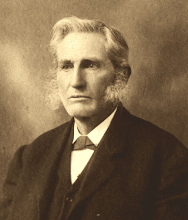Lester Frank Ward, described by some as the father of American sociology, was born June 18, 1841 in Joliet, Illinois, the son of Justus Ward and Silence Rolph. The Ward family was not wealthy so there was no extra money
with which to send Lester to school for a formal education. Instead, Ward was self educated in his youth. Some reports indicate that Ward taught himself many languages including Latin, Greek and German, and could read Russian, Japanese and Hebrew. His studies also included mathematics and geology.
His contributions to sociology are almost forgotten today, but at one time he was considered to be one of America's leading intellectuals. He has even been called an
American Aristotle.
The Ward family moved from Illinois to Myersburg, Pennsylvania while Frank was still young. By day Ward joined his brother Cyrenus in their wagon wheel shop. By night he devoured books and developed a craving for
knowledge and study. Some believe that Ward's childhood spent in poverty, followed later by hard labor in the wagon shop, instilled in Ward an outrage at society's injustice and inequalities.
In the early 1860's Ward attended classes at the Susquehana Collegiate Institute in Towanada. On August 13, 1862 he married Elizabeth "Lizzie" Caroline Bought. When the Civil War broke out, Ward joined a local Pennsylvania regiment and was seriously wounded at Chancellorville. Like many soldiers away from home to fight in the war, Ward kept a journal which is still available today under the
title Young Ward's Diary. Some of his thinking about society and
inequality developed further during his Civil War experience.
After the war he began working for the federal government while continuing his education. From 1865 to 1881 Ward was employed by the United States Treasury Department. During this period he studied at Columbian College
(now George Washington University) from which he received the A.B. degree in 1869, the LL.B. degree in 1871, and the A.M. degree in 1872.
In 1882 Ward was appointed assistant geologist for the U.S. Geological Survey, a post he held for two years. He served the USGS for the remainder
of his career in the federal government, receiving promotions to Geologist in 1889, and Paleontologist in 1892.
In addition to his USGS work, Ward was appointed Honorary Curator of the Department of Fossil Plants in the US National Museum in 1882. He remained in charge of the national collections of fossil plants until his
resignation from the USGS in 1905. In that year he accepted a faculty appointment at Brown University, where he remained until his death.
Ward is best remembered for his pioneering work in sociology. Between 1883 and his death in 1913, he completed several important works including
Dynamic Sociology (1883), Outlines of Sociology (1898), Pure Sociology (1903), and Applied Sociology (1906).
His book "Dynamic Sociology" was revolutionary, arguing that progress depended on a planned society led and controlled by a benevolent government, that provided universal education, freedom from poverty and happiness for all. When this book was first published, courses in sociology were nonexistent in American universities, and by the time the second edition was
published in 1896, sociology was being taught in all colleges.
Ward supported the idea of equality of women as well as the equality of all classes and races in society. He believed in universal education as a means of achieving this equality. Many of his ideas were unpopular among his male contemporaries, but would probably play better to an audience today.
In 1906 and 1907, Ward served as the first President of the American
Sociological Society (now known as the American Sociological Association). He also served as the editor of the American Journal of Sociology starting in 1905.
The eminent historian Henry Steele Commager said, "In perspicacity, intellectual
acumen and imagination, Lester Frank Ward takes place alongside William James, John Dewey and Oliver Wendell Holmes as one of the creative spirits of 20th century America.
Lester Ward died April 18, 1913.


No comments:
Post a Comment